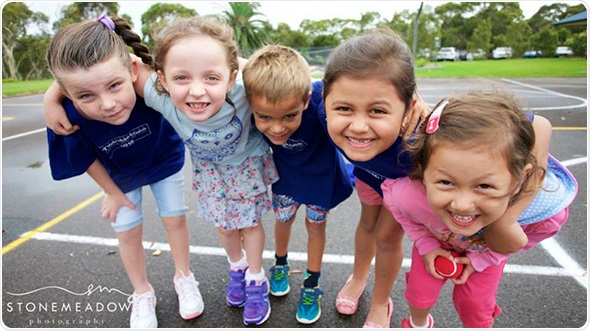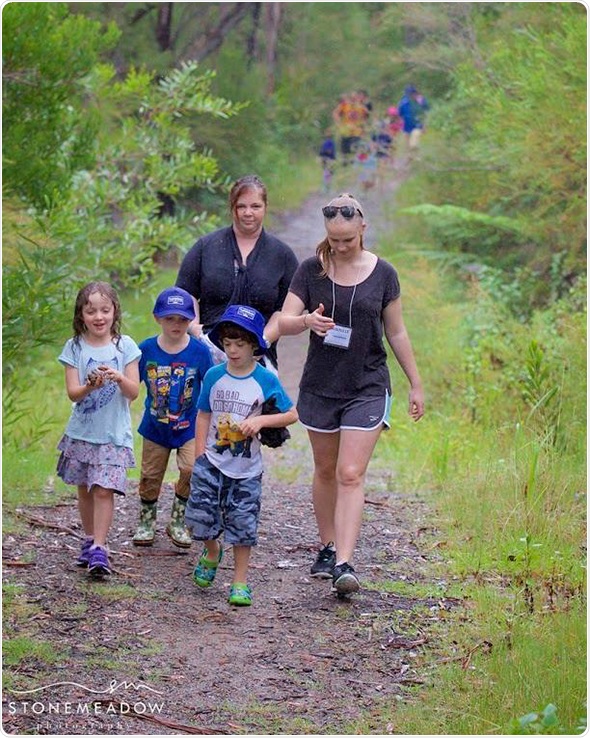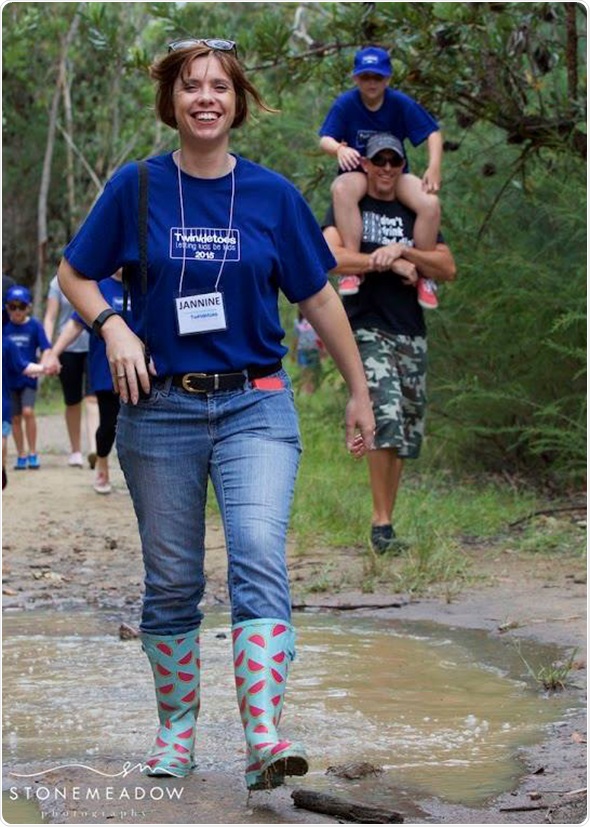Juvenile arthritis is a disease that, by definition, affects children under the age of sixteen. It's an autoimmune inflammatory condition that affects children's joints.
Several different forms of the condition are diagnosed based on how many joints are affected and whether or not other parts of the body are also affected.
When does juvenile arthritis typically present?
It can present at any age. We have a camp for small children - that's children under the age of seven - but we have kids as young as a couple of months old being diagnosed.
 Courtesy of Stonemeadow Photography @ copyright 2015. All rights reserved. (www.stonemeadow.com.au)
Courtesy of Stonemeadow Photography @ copyright 2015. All rights reserved. (www.stonemeadow.com.au)
How many children is juvenile arthritis thought to affect in New South Wales and how does this compare to other parts of the world?
Juvenile arthritis affects about one in every thousand and currently, around 6,000 kids in New South Wales have the condition.
That is certainly on a par with the rest of the world, but what is unique about the situation in New South Wales is that we don't have anywhere near the funding required to support specialists in this condition.
What is a relatively misunderstood disease here in New South Wales is not getting the treatment or even the diagnosis that's required. We're seeing the effects on children who are getting diagnosed late and also on kids who are just not getting the treatment they need.
Arthritis & Osteoporosis NSW recently launched a campaign to raise awareness of juvenile arthritis. Please can you outline this campaign and the reasons behind it?
A massive piece of research was conducted to find out what the level of support was for people with juvenile arthritis in New South Wales.
Currently, we have only two pediatric rheumatologists for all of those children. The low level of funding from New South Wales Health means that there is only one clinic - that’s one clinic for the whole state that is run for just one day a week.
If people can't afford to see someone privately, that's the only availability there is. There is no additional support -no psychological support for the child or their families, no physiotherapy support and there are no multidisciplinary teams.
What we are hearing from parents is that they are travelling interstate and driving quite long distances with a very sick child on board.
What isn’t widely known about juvenile arthritis, is that it is a very serious disease that can be fatal. If not treated early, it can lead to permanent disability, blindness, and sometimes death.
In some forms of juvenile arthritis, the mortality rate is as high as 20% and it’s just not okay to have kids that seriously ill having to travel for a whole day just to see a specialist and then having to travel for another day to get home. The strain that puts on families is enormous.
There are some brilliant therapies available to treat this disease, although it largely depends on what form of arthritis the child has. Some of the treatment requires infusions and the administration of injections, which parents need to get quite good at giving their child.
What we are after is just a basic, minimal level of support because we can't even train any more pediatric rheumatologists as we can’t provide the supervision required. What we are finding is that rheumatologists are going overseas or interstate to set up practices elsewhere, only never to return.
In an ideal world, what we would like to see is full funding of that position in the health system. The position doesn't need to be held at one specific hospital; the clinician could work across several hospitals and run clinics, even as a full time clinician. That’s not even close to enough, but it would certainly provide much more support than we currently have.
 Courtesy of Stonemeadow Photography @ copyright 2015. All rights reserved. (www.stonemeadow.com.au)
Courtesy of Stonemeadow Photography @ copyright 2015. All rights reserved. (www.stonemeadow.com.au)
How does the level of care for juvenile arthritis in NSW compare to other states in Australia and other countries?
New South Wales is the worst performing state. In Perth, for example, there may be around eight pediatric rheumatologists, whereas we have two running a clinic for one day of the week.
We have some of the best children’s hospitals in the country, yet juvenile arthritis is not on the radar for some reason.
There are three pediatric hospitals: one in Sydney, one in Westmead and one in Newcastle. All three are great pediatric hospitals, yet they are not offering the level of support that kids with juvenile arthritis need.
I think part of the reason for this is that there is a common misconception that kids don't get arthritis and that it's an old person's disease. There are a lot of myths surrounding the condition and I don't think it's been put at the forefront of people's minds at all.
When you talk to kids that have juvenile arthritis, you realise the extent of the stigma surrounding them, at school, for example, which they don’t like to talk about.
It’s a really misunderstood disease, with most people not even knowing that it's serious enough to cause permanent injury, let alone that it can make kids blind or kill them. Unfortunately, it is one of the more common rare chronic diseases to affect kids, yet very little is said or done about it.
What needs to be done to improve care for children with juvenile arthritis in NSW?
I think it needs to start with the tertiary pediatric hospitals because then you have a level of training and research that can be used to help the other hospitals. Currently, there are not the resources in the tertiary hospitals and until they do have some, we can't help any of the kids affected.
In an ideal world, I'd love to have a clinic running five days a week in one of the tertiary pediatric hospitals, as well as a rheumatology nurse working in some of the regional hospitals, dealing with the day-to-day management of kids that can be done at home or close to home.
Then, if things did become serious, they would actually have someone to refer to regarding medication, because it can only be prescribed by a pediatric rheumatologist.
What impact can juvenile arthritis have on health long-term if it is not managed properly in childhood?
There is some good news. If juvenile arthritis is managed early and appropriately, then permanent damage to the joints can be avoided. Some children can and sometimes do grow out of the illness when they reach adulthood.
However, if it is not managed early, the damage can be permanent and irreversible. Some kids end up blind, in wheelchairs and with permanent disabilities that might require a hip or knee replacement at just age 20, for example.
Sometimes, kids who have been struck with a really bad flare-up of the condition at a young age have been unable to walk for a couple of years. There are all sorts of developmental delays associated with the condition that mean affected children can’t do sports, for example, and are in terrible pain every day. That is something no parent expects for their child.
If it is not treated early, the children can end up with significant physical problems as well as mental health and emotional problems caused by the social impact of their condition.
It's not just the physical aspects that cause problems because the children are so sick, that they miss out on a lot of schooling. It also has a massive impact on the family and more often than not, one of the parents has to decide whether to work or not due to the massive toll it can take on marriages and careers.
What can people do to get involved in Arthritis & Osteoporosis NSW’s Juvenile Arthritis Campaign?
At this point, all we're asking people to do is to sign a petition so that we can get some kind of support in order to help us change the situation. People can visit our website to do this.
There are also many things we do for these children on a day-to-day level such as running camps and providing social support for the children and their families.
People can help fund some of this support or sign our petition. People need to understand how serious the disease is and that children with the disease and their families need understanding, not judgement.
 Courtesy of Stonemeadow Photography @ copyright 2015. All rights reserved. (www.stonemeadow.com.au)
Courtesy of Stonemeadow Photography @ copyright 2015. All rights reserved. (www.stonemeadow.com.au)
Where can readers find more information?
If you want to get involved but are not sure where to start, please call us on 1800 011 041 or visit www.arthritisnsw.org.au.
About Jannine Jackson
Jannine has worked in the not for profit sector for 15 years in fundraising, marketing and management. Working in both large and small organisations spanning health, welfare, government and disability sectors. Held various senior management and board positions across those organisations. She has been sought out to speak on developing partnerships and sustainability. She is passionate about helping others and making a difference. It is through her passion for helping others and making a difference in the lives of others that has been her driving force.
She has had many career highlights and been instrumental in setting up large scale campaigns and partnerships which are still running 10 years later. Jannine was the first Australian to win an international fundraising award.